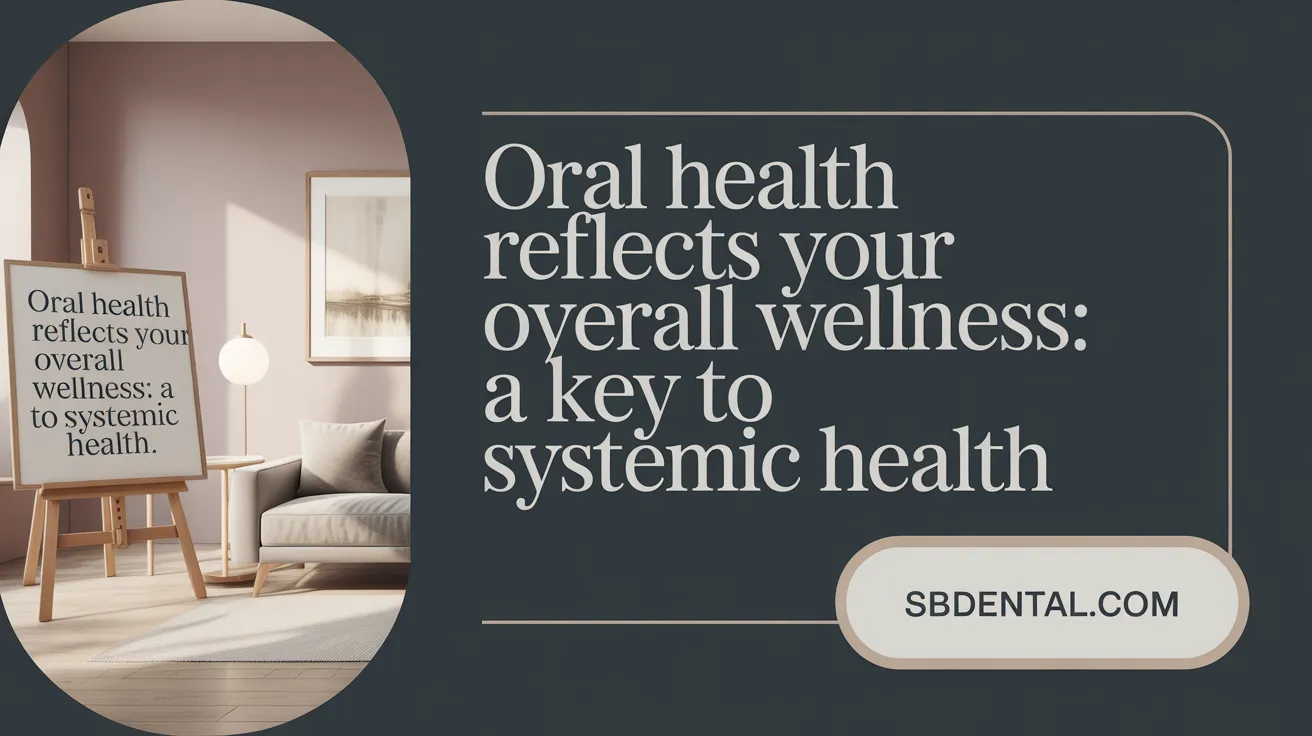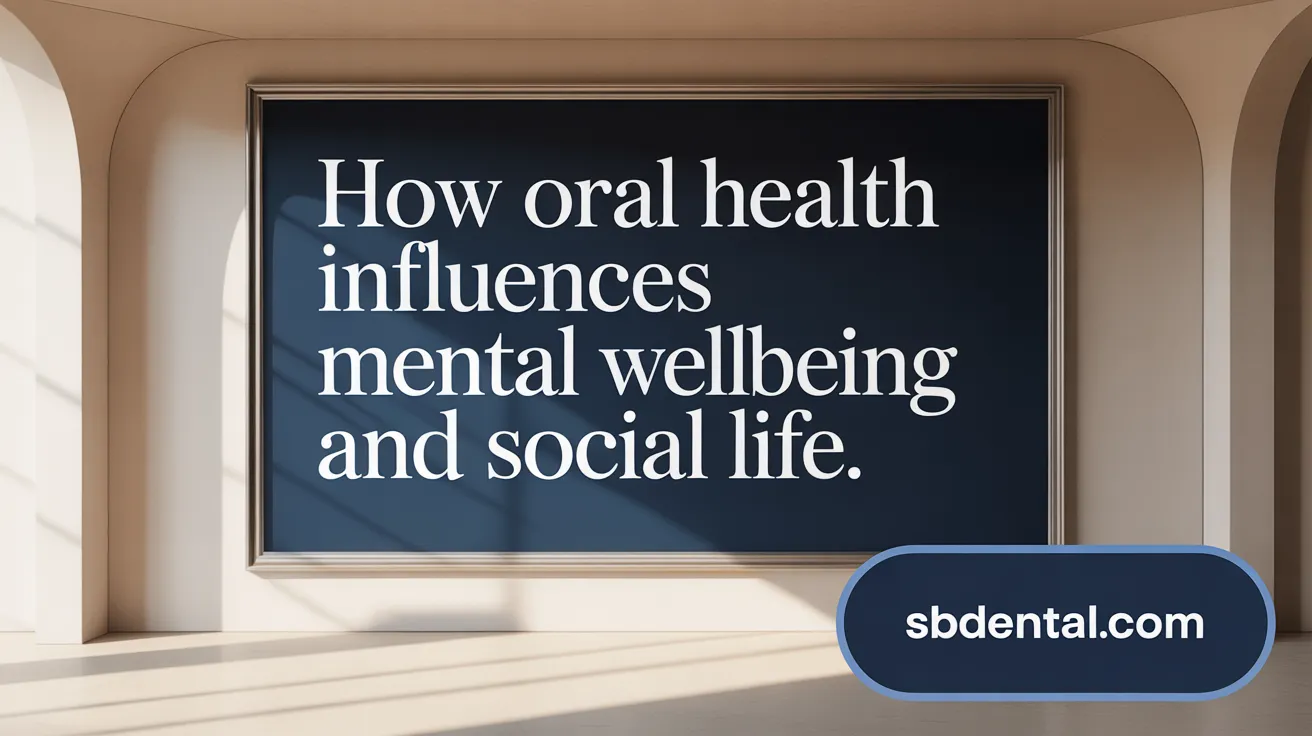Understanding Oral Health as a Gateway to Overall Wellbeing
Oral health is more than just a bright smile or fresh breath; it serves as a fundamental pillar for maintaining systemic health and overall wellbeing. The mouth is a complex ecosystem affecting vital functions such as eating, speaking, and social interactions, while also acting as a potential entry point for pathogens that can influence diseases throughout the body. This narrative explores the intricate connections between oral hygiene, systemic health conditions, and preventive strategies essential for holistic wellness.
Oral Health: A Crucial Indicator of Whole-Body Wellness

What is Included in Oral Health?
Oral health refers to the condition of various parts of the mouth, including teeth, gums, ligaments, muscles, glands, and nerves. It goes beyond just the appearance of a smile to support vital functions like speaking, chewing, swallowing, and expressing emotions. Maintaining the health of these components is essential not only for comfort and daily function but also for overall well-being.
What Functions Does Oral Health Serve Beyond Aesthetics?
The functions of oral health extend far beyond looks. Healthy oral structures enable clear speech, efficient chewing and digestion, taste perception, and the ability to smile or express emotions. Poor oral health can result in pain, difficulty eating, speech issues, and reduced social interaction, all impacting quality of life (psychosocial wellbeing).
How Can Oral Diseases Affect Overall Health?
Oral diseases, especially gum disease (periodontitis), have systemic implications. The bacteria responsible can enter the bloodstream, contributing to chronic inflammation and infections elsewhere in the body. Scientific studies link poor oral health to cardiovascular disease, diabetes complications, respiratory infections, adverse pregnancy outcomes, and some cancers (oral health and systemic diseases).
What Role Does the Oral Microbiome Play in Systemic Health?
The oral cavity hosts a diverse microbiome necessary for oral balance. However, disruptions (dysbiosis) caused by poor hygiene or disease can increase harmful bacteria levels, which may enter systemic circulation or influence other microbiomes, such as the gut. This bacterial spread can exacerbate systemic conditions like inflammatory bowel disease, rheumatoid arthritis, and metabolic disorders (oral microbiome and systemic disease).
How Does Oral Health Serve as an Early Indicator of Systemic Diseases?
Since many systemic diseases present early signs in the mouth, oral health status often reflects broader health. Lesions or oral inflammation can signal HIV/AIDS progression or indicate diabetes control issues. Saliva testing is also emerging as a non-invasive method to monitor chronic diseases by detecting hormones, antibodies, and toxins (saliva testing for chronic disease).
How Does Oral Health Reflect Overall Health?
Oral health is a window into overall health because poor oral condition often accompanies or precedes systemic disease. Harmful oral bacteria can travel to other organs, fueling inflammation and complicating medical conditions such as heart disease and diabetes. Thus, oral health assessment plays a valuable role in early detection and management of systemic illnesses, emphasizing the importance of integrated health care approaches.
The Two-Way Link Between Oral Health and Chronic Diseases

What are the connections between oral diseases and chronic illnesses like diabetes and heart disease?
Periodontal disease, a common gum infection, shows a strong bidirectional relationship with chronic illnesses such as diabetes and cardiovascular disease. People with diabetes are more prone to developing periodontal disease due to impaired immune responses, making infection control difficult. At the same time, the inflammation and bacterial burden from gum disease can worsen blood sugar control, complicating diabetes management (Oral health and diabetes; Periodontal Disease and Diabetes).
How does gum disease impact cardiovascular risk and blood sugar control?
Chronic inflammation from periodontal infections allows oral bacteria to enter the bloodstream, promoting systemic inflammation. This process can lead to the formation of plaques in arteries, increasing the risk of heart attack, stroke, and other cardiovascular events (Periodontal disease and systemic conditions; Oral Health and Cardiovascular Disease). Moreover, the inflammatory response can interfere with glucose metabolism, making glycemic control more challenging for diabetic patients (Gum disease and diabetes link).
What mechanisms link periodontal disease and systemic inflammation?
Periodontal disease triggers persistent immune responses due to bacterial invasion, resulting in elevated inflammatory markers circulating systemically (Oral microbiota and oral homeostasis. These inflammatory mediators can contribute to atherosclerosis and insulin resistance. Additionally, periodontal pathogens induce dysbiosis and bacteremia, impacting remote organs beyond the mouth (Periodontal disease impact on chronic conditions).
How do systemic diseases influence oral health?
Chronic conditions such as diabetes not only predispose individuals to periodontal disease but also impair healing and saliva production (Medications reducing saliva flow). Other systemic illnesses like cardiovascular disease and metabolic syndrome share common risk factors like smoking and poor diet, which further aggravate oral health (Systemic conditions and oral diseases).
What role do chronic inflammation and immune response play in oral-systemic health?
Chronic inflammation acts as a bridge connecting oral and systemic diseases. An overactive or dysregulated immune response can accelerate tissue damage in gums and exacerbate systemic diseases, creating a damaging feedback loop (Chronic systemic inflammation and periodontal disease). Managing periodontal inflammation is therefore vital for improving both oral and overall health outcomes (Oral health and overall health.
Oral Hygiene Practices to Support Systemic Health
What oral hygiene practices help maintain overall health?
Maintaining good oral hygiene is essential not only for preventing oral diseases but also for supporting systemic health. Key daily practices include brushing teeth at least twice a day with fluoride toothpaste, which strengthens enamel and helps prevent cavities. Flossing or using interdental brushes to clean between teeth removes plaque and food particles unreachable by brushing alone. Using an antibacterial mouthwash can further reduce harmful bacteria in the mouth (role of oral hygiene in health).
Importance of fluoride use and proper brushing technique
Fluoride in toothpaste plays a crucial role by making teeth more resistant to decay. Proper brushing technique involves angling the bristles toward the gumline, using gentle circular motions, covering all tooth surfaces, and cleaning the tongue to reduce bacteria (Proper oral hygiene).
Role of diet in oral and overall health
A healthy diet supports oral and systemic health. Limiting sugary foods and drinks decreases the risk of tooth decay and gum disease while supporting metabolic health. Eating nutrient-rich foods like fruits, vegetables, and whole grains strengthens teeth and gums (Nutrition's Role in Oral Health).
Impact of medications on saliva and oral health risks
Certain medications can reduce saliva flow, which normally washes away food and balances acids in the mouth. Reduced saliva increases the risk of infections and tooth decay, emphasizing the need for extra oral hygiene care and professional monitoring among those taking such medicines (Medications affecting oral health.
Benefits of routine dental visits and professional cleaning
Regular dental checkups and professional cleanings are vital for maintaining oral health and detecting problems early. These visits help prevent cavities and gum disease, which are linked to systemic conditions such as heart disease and diabetes (Importance of regular dental check-ups.
Avoiding tobacco and managing risk factors
Avoiding tobacco use significantly reduces the risk of periodontal disease and oral cancers. Managing risk factors like smoking and poor diet is essential for both oral and overall health (Tobacco and oral health.
By following daily oral care routines, including brushing, flossing, and maintaining a healthy diet, alongside regular professional care, individuals can protect not only their teeth and gums but also support their broader systemic health (Oral health and overall health.
Oral Health Challenges in Vulnerable and Special Populations

How do systemic conditions and social factors affect oral health?
Systemic diseases like diabetes, HIV/AIDS, and Alzheimer's disease significantly influence oral health. Diabetes impairs immune function, increasing susceptibility to periodontal disease while making blood sugar control more difficult. HIV/AIDS patients frequently suffer from painful mouth sores and other oral complications. Alzheimer's disease progression is commonly accompanied by deteriorating oral health due to factors like diminished self-care and increased plaque accumulation.
What disparities exist among vulnerable populations?
Oral health disparities disproportionately affect marginalized populations such as racial and ethnic minorities, low-income groups, the elderly, and those living in rural areas. Barriers such as cost, limited dental care access, and social determinants of health contribute to higher rates of untreated oral diseases in these communities.
How do medications impact oral health?
Certain medications—such as painkillers, antihistamines, antidepressants, and diuretics—reduce saliva production, causing dry mouth (xerostomia). Saliva normally helps wash away food particles and control bacteria; its reduction heightens the risk of tooth decay and oral infections.
What are the oral health risks during pregnancy?
Hormonal fluctuations during pregnancy can increase gum inflammation and periodontitis severity. Poor oral health in pregnant women is associated with complications such as preterm birth, low birth weight, gestational diabetes, and preeclampsia, emphasizing the need for targeted oral care in this group.
How does mental health affect oral hygiene and dental care access?
Mental health challenges often lead to anxiety about dental visits, poor nutrition, and difficulties maintaining daily oral hygiene practices. These factors contribute to higher incidences of tooth decay, gum disease, and dry mouth among individuals with psychiatric conditions. Furthermore, social anxiety and embarrassment can reduce dental care utilization. The connection between dental health and mental health highlights the importance of collaboration between healthcare professionals.
Maintaining oral health in these vulnerable populations requires addressing both the medical factors influencing oral conditions and the social determinants that limit care access. Integrated healthcare approaches and tailored prevention strategies are essential to reduce disparities and improve overall health outcomes.
The Psychological and Social Impact of Oral Health

What is the connection between oral health and mental health?
Poor oral health has a profound influence on mental health by causing persistent pain, discomfort, and embarrassment about dental appearance. This can diminish self-esteem and lead to social withdrawal, limiting interactions essential for emotional wellbeing. Additionally, individuals facing mental health challenges may neglect oral hygiene and find it harder to access dental care, exacerbating their dental issues (source).
Effects on self-esteem, social interactions, and quality of life
Dental problems such as tooth loss, decay, and bad breath can severely impact self-confidence, affecting one's willingness to smile and communicate openly. This often results in social isolation and reduced participation in social or professional environments, negatively affecting overall quality of life (source).
Dental anxiety and barriers to treatment
Mental health conditions can cause or worsen dental anxiety, leading to avoidance of dental visits, delayed treatments, and progression of oral diseases. This creates a vicious cycle where untreated oral health issues contribute to further psychological distress (source.
Oral health's role in communication and emotional expression
Oral health is crucial for clear speech and the ability to express emotions through facial expressions like smiling, laughing, and frowning. Impairments due to oral diseases can hinder these functions, affecting personal and social communication (source.
Impact of oral diseases on daily functioning
Oral diseases cause pain and discomfort that can interfere with eating, speaking, and daily routines, further harming physical and mental health. For older adults, comprehensive oral care supports better nutrition and may reduce risks of mental decline, including dementia and Alzheimer's disease (source).
Maintaining good oral health through regular hygiene and dental visits is essential not only to physical wellbeing but also for preserving mental health, social participation, and overall quality of life (source.
Public Health and Policy Initiatives to Promote Oral and Overall Wellbeing

How do public health efforts improve oral health and overall wellbeing?
Public health initiatives are crucial in promoting oral health equity and enhancing overall well-being. One effective approach is community water fluoridation, which reduces dental cavities by about 25% in both children and adults, providing wide-reaching protection especially for underserved populations.
School-based dental sealant programs also play a vital role by preventing cavities among children from low-income families and saving millions in treatment costs annually. These programs help address disparities for vulnerable groups facing barriers to care.
Addressing social determinants of health—such as socioeconomic status, education, and access to care—is fundamental in reducing oral health disparities. Public health policies targeting these determinants improve oral health outcomes while promoting equity.
Integrating oral health with primary health care supports early detection of oral diseases and systemic conditions. This holistic approach facilitates coordinated care, improving patient health at large.
Workforce innovations like deploying dental therapists and expanding the scope of practice empower communities with more accessible oral care services. These strategies help overcome provider shortages in rural and underserved areas.
Emerging models including teledentistry offer remote consultations and education, increasing access where traditional care may be scarce. Interprofessional education programs foster collaboration among dental and medical professionals, enhancing comprehensive patient management.
The societal benefits are significant: improved oral health reduces healthcare costs, minimizes lost school and work days, and elevates quality of life through better physical, mental, and social well-being.
Public health efforts continue to evolve with these integrated, community-based models, ensuring broader access and sustained improvements in both oral and overall health.
Oral Health: A Cornerstone of Holistic Wellbeing
Maintaining oral health is essential not only for preserving the functions and appearance of the mouth but also for safeguarding overall health and quality of life. The complex connections between oral diseases and systemic conditions like diabetes, heart disease, and neurodegenerative disorders underscore the importance of integrating oral hygiene into everyday health practices and medical care. Preventive measures through diligent personal care, regular professional checkups, and public health initiatives play a crucial role in reducing disease burden and health disparities. By recognizing the mouth as a window to general wellbeing, individuals and healthcare systems can work together to foster healthier lives and stronger communities.
